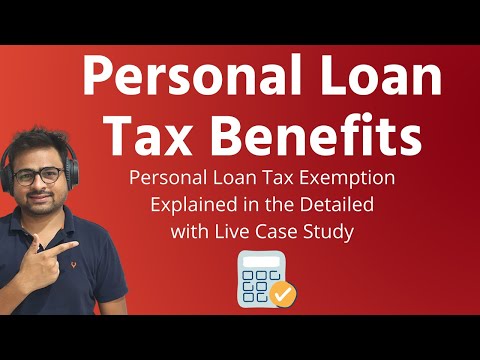Understanding Personal Loan Taxes in 2024
When it comes to personal finances, few topics raise as many eyebrows as taxes. In particular, the nuances of personal loan taxes can leave many borrowers scratching their heads. As we navigate through 2024, understanding the tax implications of personal loans has never been more crucial.

The Surprising Truth About Personal Loan Taxes and IRS Guidelines
Here’s the deal, my friends. Under IRS regulations, personal loans are a bit of a chameleon—because they must be repaid, they are not treated as taxable income. But hold your horses, it’s not all straightforward. In the event a personal loan is forgiven, you’ve just entered taxable territory. That’s right, it becomes cancellation of debt (COD) income, and you’ll be cozying up to a 1099-C tax form come filing season.

Interest Deductions: A Hidden Gem for Borrowers
Let’s chat about your personal loan interest. Unlike other loans, personal ones don’t typically offer an interest deduction banquet. But here’s a glimmer of hope: if you’ve reinvested your personal loan into business expenses or, let’s say, define Deals, you might be able to sneak in an interest deduction.
Care for a comparison? Mortgage and student loan interests are like the Wilson Pickett of tax deductions; they increase your refund boogie. Personal loan taxes usually sit in the corner—unless, of course, they’re earning their keep in your business venture.

The Impact of Loan Forgiveness on Your Tax Bill
Now imagine your loan is forgiven. It’s like a financial fairytale—except this one could end with a tax twist. The IRS will transform that forgiven amount into COD income. And just like that, what was once a debt is now dressed up as income for tax purposes.
Unveiling the Potential Tax Pitfalls of Peer-to-Peer Lending
Ah, peer-to-peer (P2P) lending: the modern way to play banker. While it’s all “meet me on the internet” and “you scratch my back, I scratch yours,” there are tax tripwires to watch out for.
The Role of Personal Loans in Tax Evasion Crackdowns
No one’s pointing fingers, but it’s common knowledge that personal loans can be, and have been, a tool in tax evasion shenanigans. Remember, the IRS doesn’t wear a blindfold; it sees the misuse and has amped up its vigilance.
Does Refinancing a Personal Loan Affect Your Taxes?
If you’re pondering a personal loan do-over, otherwise known as refinancing, tax consequences might be a blip on your radar.
The Big Question: Are Personal Loans Considered Taxable Income?
Let’s bust a myth: personal loans puffing up your taxable income? Not quite. The IRS has a secret sauce for deciding what counts as non-taxable loan proceeds. It boils down to the intention and structure of the loan—a meticulously crafted loan agreement is like a cursive d in a world of textspeak.
Innovative Loan Products and Their Tax Implications
With innovations blooming faster than spring flowers, 2024 welcomes new loan products. We’ve got blockchain-based loans stepping quietly onto the stage, and they’re rich with tax implications as well.

Conclusion: Redefining Personal Loan Taxes in 2024
As we wrap this up, let’s take a moment. The world of personal loan taxes is an evolutionary beast—a complex dance of IRS rules and revolutionary products. Don’t get left behind; instead, arm yourself with knowledge and make those personal loans a power move in your financial strategy.

Stay sharp. Embrace financial literacy like your wealth depends on it, because, well, it does. Engage in proactive tax planning, and soon enough, you’ll be spinning personal loans into tax-savvy opportunities. And remember, a well-informed borrower is the IRS’s best friend.
Uncovering the Mysteries of Personal Loan Taxes
When it comes to personal loan taxes, the waters can get a bit murky, and you might find yourself scratching your head, wondering how Uncle Sam views your borrowed bucks. But hold onto your calculators, tax-filers! It’s time to plunge into some electrifying trivia and fun facts that will shine a light on the bewildering world of personal loan taxes. So buckle up; we’re about to do some myth-busting and learning, all while having a blast!
Wait a Minute, Are Personal Loans Even Taxable?
Whoa, Nelly! Did you know that when you take out a personal loan, the IRS doesn’t consider that cash as income? That’s right, your hard-earned dollars aren’t on the tax hook just because you borrowed some extra moolah. So breathe easy, and let’s toast to the fact that not everything that glitters in your bank account comes with a tax!
The Deduction Conundrum: It’s Not Always Black and White
Now, hold your horses! While your personal loan itself is not taxed, did you know that if you play your cards right, parts of it can slide into tax-deductible territory? You’re probably thinking, “Well, how’s that?” You see, imagine you’re a bright-eyed, savvy homeowner who decides to use a personal loan for the sole purpose of making home improvements. In that case, some of the interest you pay might just wink at you come tax season. But remember, it’s not a walk in the park – you’ve got to keep those records squeaky clean!
The Real Deal on Real Estate
Speaking of home improvements, let’s say you’re chatting with a realtor, seeking the perfect crib to transform into your dream home. Now, if you’re curious about the realtor meaning, don’t fret. A realtor is your trusty guide in the real estate jungle, a professional ready to help you navigate through listings, negotiations, and yes, even giving you advice on financing your home purchase. But remember, if you’re wheeling and dealing in real estate, keep those personal loan taxes in mind – they can be a bit of a wild card.
Surprise! Your Lender Might Pay Taxes for You
And here’s a curveball for you: sometimes, if a lender is feeling particularly generous and decides to forgive your loan balance (we know, it’s like finding a unicorn!), that forgiven debt could be seen by Uncle Sam as taxable income. Yikes! But, if your charm and negotiation skills lead to this financial fairy tale ending, make sure you’re ready to deal with the tax man’s appetite.
The Conclusion That’s Not Really a Conclusion
So there you have it, folks! The maze of personal loan taxes isn’t as straightforward as it seems. Whether you’re rolling in dough or just trying to paddle through the sea of expenses, understanding how personal loans play into your taxes is critical. Keep these facts in your back pocket, and you’ll be navigating the personal loan tax waters like an old sea captain. Ahoy, and may your tax journey be as smooth as a sail on a calm sea!

Is a personal loan taxable income?
Is a personal loan taxable income?
Well, here’s the scoop: A personal loan isn’t considered taxable income. Why’s that? Because it’s money you gotta pay back to the lender – it’s not a gift or a bonus, folks! But hang on a minute, if you’re suddenly off the hook and don’t have to repay what you borrowed (lucky you!), that’s a different kettle of fish. This forgiven loan transforms into taxable income, and you’ll get slapped with a 1099-C form come tax time. Bummer, right?
Can I write off a personal loan on my taxes?
Can I write off a personal loan on my taxes?
Oh, wouldn’t that be nice? But sadly, you can’t just write off a personal loan on your taxes like it’s last year’s fashion. Unlike interest on mortgages or student loans, personal loan interest doesn’t get you any tax breaks. The tax man says “Nope” unless you’ve splurged that personal loan on business expenses. Then, my friend, you might just be in luck with a little tax-deductible action.
Do you need to show tax returns to get a personal loan?
Do you need to show tax returns to get a personal loan?
Heads up, borrowers: Most lenders are gonna wanna see that you’ve got the green to keep up with loan payments. And yep, that means you might need to show your tax returns – typically two years’ worth. That, together with some fresh pay stubs, will prove you aren’t just whistling Dixie about your income.
Do I pay tax on interest earned from a loan?
Do I pay tax on interest earned from a loan?
Bingo! You guessed it – Uncle Sam wants his cut of pretty much any interest you earn. If it lands in your pocket or an account where you can snag it without a penalty, you’ll likely owe taxes on it. But hold your horses – some interest could be tax-exempt. Always worth checking, right?
Is it a bad idea to take out a personal loan?
Is it a bad idea to take out a personal loan?
Look, taking out a personal loan isn’t inherently good or bad – it’s all about the why and the how. Need to consolidate debt or cover an emergency? Could be a smart move. But diving headfirst into debt for, say, a swanky vacation? You might wanna think twice and budget first, cowboy.
What counts as income for a personal loan?
What counts as income for a personal loan?
Here’s how it shakes out: When you’re in the hot seat applying for a personal loan, lenders aren’t just going to take your word for it that you’re rolling in dough. They’ll want the nitty-gritty on your cash flow, which usually means pay stubs, tax returns, or other proof that you aren’t counting pennies.
Does a personal loan show up on credit report?
Does a personal loan show up on credit report?
Yep, it sure does! A personal loan will waltz right onto your credit report and cozy up with your other financial dealings. This means your management of the loan – good or bad – will mingle with your credit history. Keep those payments punctual, and it’s all copacetic.
Can I loan money to family tax free?
Can I loan money to family tax free?
Ah, the ol’ family loan conundrum. The good news? You definitely can loan money to your family tax-free. But don’t go throw caution to the wind – there are rules to follow, like potentially charging interest, to keep the tax hounds at bay. Stick to the IRS playbook, and you won’t get benched.
Can I write off a loan to a family member?
Can I write off a loan to a family member?
Nope, that ain’t how it works. When you loan dough to a family member, you’re not opening a tax deduction door. On the flipside, if they pay you interest, you’ll add that to your tax return. Family love is grand, but in the eyes of the IRS, it’s not a tax break.
How hard is it to get a $30,000 personal loan?
How hard is it to get a $30,000 personal loan?
Tough question! Scoring a $30,000 personal loan isn’t exactly a walk in the park. Lenders will give you the third degree – eyeing your credit score, income, and debts. Stellar credit and a solid income can swing the odds in your favor. Fall short, and you’ll hit a snag on that request.
Is it hard to get a 50k personal loan?
Is it hard to get a 50k personal loan?
Ramping up to a $50k personal loan? You’re upping the ante, and lenders are likely to be sticklers. Be ready to showcase an impressive credit score, a robust income, and plenty of evidence that you’re not a financial hot potato. It’s doable, sure, but as easy as pie? Not really.
When should you consider borrowing a private loan?
When should you consider borrowing a private loan?
Say you’re eyeing a private loan – it’s not a decision to make on a whim. Consider dipping into this well when other tricks like federal student loans or a solid emergency fund don’t cut it. If you’re at the crossroads facing high-interest debt or unexpected bills, a private loan might just be your ticket.
Do I need to report interest income from a personal loan?
Do I need to report interest income from a personal loan?
You betcha. If you’re on the receiving end of interest payments from a personal loan you dished out, Uncle Sam’s hand is outstretched, waiting for his slice. This interest income should be reported on your taxes unless you’re dealing with some rare tax-exempt situation.
What is the best personal loan?
What is the best personal loan?
Ah, the “best” personal loan is like trying to pick the top flavor at an ice cream shop – it’s all about what suits your taste… or in this case, your situation. You’ll want to hunt for low interest rates, minimal fees, and terms that don’t make you sweat. Do your homework and compare before shaking hands with a lender.
How much interest can I earn without reporting to IRS?
How much interest can I earn without reporting to IRS?
Listen up, because this is a golden nugget: The IRS isn’t interested in peanuts. Normally, if you earn less than $10 in interest from any one source, you might not have to report it. Before you pop the champagne, make sure all your other interest doesn’t add up to more than the standard threshold!
Do federal loans count as taxable income?
Do federal loans count as taxable income?
Thankfully, no. When you snag a federal loan, it’s not considered income because, guess what? You’ll have to pay that money back. The IRS isn’t going to tax you on it, which is one less worry as you’re hitting the books or paying for that new furnace.
Can you write off a loan to a friend?
Can you write off a loan to a friend?
Nice try, but no cigar. A loan to a pal isn’t a ticket to a tax break. Loans are all about the borrow and repay, not about snagging a deduction. And yikes, if they’re tossing you interest, now you’ve got income to declare. Always a twist, right? Remember, it’s not personal, it’s the IRS.



